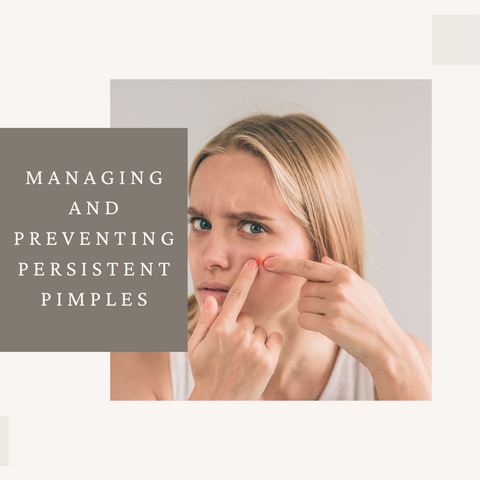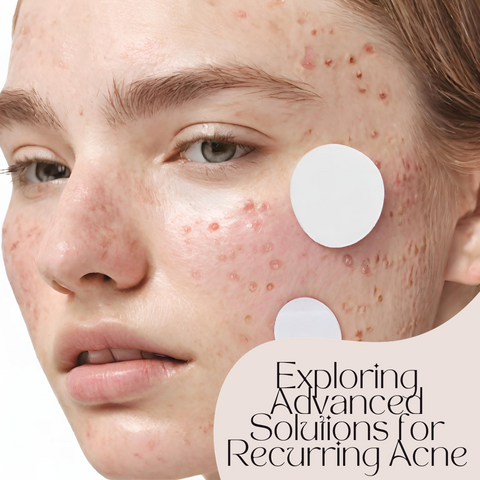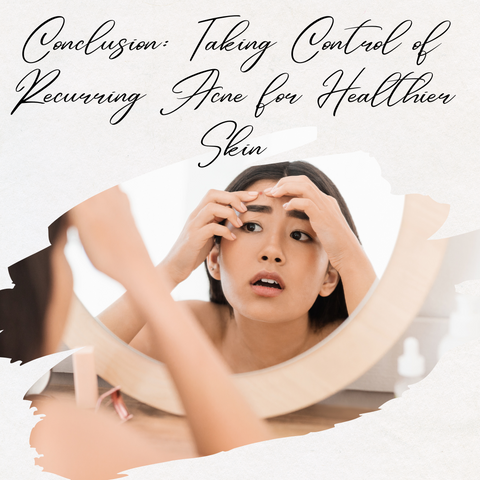The return of pimples in the same regions can be caused by a variety of circumstances, and recognising these patterns can provide insights into the causes and potential preventive treatments. In this blog, we'll look at some of the reasons why pimples reoccur in the same spots.
Unraveling the Reasons Behind Recurrent Pimples

Recurrent pimples can be aggravating, and a variety of conditions may lead to their return. Understanding these reasons can aid in addressing the underlying issues and putting preventive measures in place. Hormonal swings, heredity, clogged pores, nutrition and lifestyle, poor skincare habits, bacterial infection, allergies or sensitivities, environmental factors, underlying skin problems, and pharmaceutical side effects are all typical causes of recurring pimples. Consider contacting a dermatologist if you have persistent or recurring pimples. A dermatologist can examine your skin, determine the underlying causes, and offer a treatment plan that may involve lifestyle changes, skincare improvements, or prescription drugs.
How Pimples Form: The Skin Cycle
Acne, or acne vulgaris, is another name for pimples. It is caused by various things that the skin experiences during its lifetime. Understanding the skin cycle and the mechanisms involved can help explain how pimples form. The skin cycle and key steps in pimple formation, such as skin structure, hair follicles and sebaceous glands, normal skin renewal, sebum production, comedone formation, bacterial involvement, inflammation, pimple formation, pimple life cycle and scarring, and post-inflammatory hyperpigmentation, are discussed.
Factors Contributing to Pimple Formation:
-
Hormone fluctuations, particularly during puberty, menstruation, and pregnancy, can affect sebum production.
-
Genetic factors influence skin type, oil production, and acne susceptibility.
-
A high-glycemic diet, for example, may contribute to the development of acne in some people.
Understanding the skin cycle and the factors that contribute to acne formation can help guide efforts to prevent and manage acne. Consistent and proper skincare, combined with lifestyle changes, may help maintain skin health and reduce the risk of acne formation. If acne is persistent or severe, consulting a dermatologist for tailored treatment options is advised.
Role of Pores and Sebaceous Glands in Acne
The role of pores and sebaceous glands in the development of acne is critical. Acne is a common skin condition that appears as pimples, blackheads, and whiteheads due to oil and dead skin cells clogging hair follicles. Understanding the roles of pores and sebaceous glands contributes to a better understanding of the mechanisms underlying acne development, including pores, sebaceous glands, the role of sebum in acne development, factors influencing sebum production, and the role of pores in acne scarring. Effective acne care frequently entails controlling sebum production, preventing pore blockage, and managing inflammation with treatments ranging from topical drugs to oral medications and lifestyle changes. Individuals who are concerned about acne should consult dermatologists for personalised advice and treatment alternatives.
Hormonal Factors and Chronic Acne
Hormonal factors play a significant role in the initiation and evolution of chronic acne. Changes in hormone levels, particularly androgens, can disrupt sebaceous gland function, resulting in increased sebum production and acne lesions. Here's a closer look at how hormonal factors influence persistent acne:
-
Androgens and Sebum Production: The stimulation of sebaceous glands is largely dependent on androgens, such as testosterone. During puberty, there is an increase in androgen levels. Elevated androgens stimulate the sebaceous glands to produce more sebum, which contributes to the development of acne.
-
Hormonal Fluctuations: Changes in hormones during the menstrual cycle may have an impact on acne in women. Many women develop premenstrual acne flare-ups as a result of increased androgen activity in the days preceding menstruation.
-
Polycystic Ovary Syndrome (PCOS): Females diagnosed with PCOS (polycystic ovary syndrome) frequently exhibit elevated testosterone levels. Chronic acne and other symptoms like irregular periods and ovarian cysts can result from this hormonal imbalance.
-
Hormonal Changes During Pregnancy: Hormonal changes, including an increase in androgens, can cause acne in some pregnant women.
-
Hormonal Changes in Adolescence: The hormonal changes that come with puberty, particularly the increase in androgens, are partially responsible for acne. This is a common phase of transient acne that some people may carry into their adult years.
-
Hormonal Acne in Adulthood: Hormonal changes in adulthood can cause acne in certain people. It can affect both sexes, and the hallmark is frequently a concentration of lesions around the chin and jawline.
-
Hormonal Treatments for Acne: Some oral contraceptives with anti-androgenic qualities may be recommended to women with acne to balance hormones. Anti-androgen drugs are sometimes prescribed to lower androgen activity and manage acne.
-
Stress and Hormones: Stress can cause the release of cortisol, a stress hormone, which can impact androgen levels. Elevated cortisol levels can contribute to increased sebum production and acne flare-ups.
-
Impact of Hormones on Inflammation: Changes in hormone levels can impact the skin's inflammatory response, potentially exacerbating the inflammation brought on by acne lesions.
-
Hormonal Evaluation: Individuals with chronic or persistent acne should see a doctor, especially if they also have other symptoms such as irregular periods or signs of a hormonal imbalance. Hormonal assessments can be carried out by gynaecologists, endocrinologists, or dermatologists to determine the underlying causes.
Treatment Approaches:
-
Topical and Oral Medications: Dermatologists may recommend topical or oral drugs to reduce sebum production, irritation, and bacterial overgrowth.
-
Hormonal Therapies: Hormonal therapy, such as oral contraceptives or anti-androgen medicines, may be advised in some circumstances.
Understanding the hormonal variables that contribute to persistent acne is critical for establishing focused treatment options. Treatment strategies are frequently tailored to specific hormonal variables as well as individual health considerations. If you have chronic acne, talking with a dermatologist or other healthcare professional can help you choose the best course of action for your unique case.
Managing and Preventing Persistent Pimples

Managing and preventing chronic pimples necessitates a multifaceted approach that targets underlying reasons, encourages healthy skin habits, and combines effective skincare methods. Here are some tips for dealing with and preventing chronic pimples:
-
Gentle Cleansing: Wash your face twice a day with a mild, fragrance-free cleanser. Avoid using harsh or abrasive cleansers because they can strip the skin of its natural oils, potentially leading to increased sebum production.
-
Non-Comedogenic Products: To reduce the danger of pore-clogging, use non-comedogenic skincare and cosmetics products. Pimples are less likely to emerge while using non-comedogenic products.
-
Avoid Touching or Picking: Refrain from touching or picking at pimples, since this can introduce bacteria, aggravate inflammation, and cause scarring. To prevent the spread of bacteria, keep your hands away from your face.
-
Regular Exfoliation: Exfoliate your skin regularly to remove dead skin cells that can clog pores. Use a mild exfoliant containing salicylic acid or alpha hydroxy acids (AHAs).
-
Topical Treatments: Use over-the-counter topical treatments that contain benzoyl peroxide or salicylic acid. These can help control acne and prevent new pimples from forming.
-
Prescription Medications: If over-the-counter medications are ineffective, see a dermatologist for prescription medications. Topical retinoids, antibiotics, and oral contraceptives may be used to treat hormonal acne in women.
-
Hormonal Management: Hormonal management options, such as oral contraceptives or anti-androgen medicines, may be prescribed for persons with hormonal acne under the supervision of a healthcare expert.
-
Healthy Diet: Maintain a healthy and well-balanced diet. Certain dietary components, such as high-glycemic meals and dairy, have been linked to acne in some studies. Experiment with your diet to see whether particular foods cause pimples.
-
Hydration: Keep yourself hydrated by drinking plenty of water. Hydration is important for overall skin health.
-
Stress Management: Engage in stress-reduction activities such as meditation, yoga, or deep breathing exercises. Stress can cause hormonal fluctuations, which can aggravate acne.
-
Regular Exercise: Regular physical activity can help improve circulation and promote overall skin health. Shower immediately after working out to remove sweat and prevent pore blockage.
-
Adequate Sleep: Make sure you get enough rest every night. Sleep deprivation can contribute to stress and have an impact on skin health.
-
Avoid Harsh Weather Conditions: Protect your skin from harsh weather conditions that can irritate it, such as extreme cold or wind.
-
Regular Dermatologist Visits: Make regular appointments with a dermatologist, especially if you have persistent pimples. Dermatologists can offer tailored advice and treatment options.
-
Allergen Avoidance: If you suspect that certain products or ingredients are causing pimples, consider eliminating them from your routine and gradually reintroducing them to identify potential allergens.
-
Habitual Changes: Examine your lifestyle habits, such as sleeping positions, phone hygiene, and pillowcase cleanliness, to reduce potential sources of skin irritation.
-
Sun Protection: To protect your skin from UV damage, use a broad-spectrum sunscreen with at least SPF 30. Some acne medications can make you more sensitive to the sun.
-
Professional Treatments: Under the supervision of a dermatologist, investigate professional skincare treatments such as chemical peels or laser therapy.
It could take some time to notice changes when using these strategies, so consistency is essential. A dermatologist can offer specialised advice and treatment options based on your unique skin type and concerns if you are worried about persistent pimples.
Key Prevention Strategies for Recurring Acne
Recurrent acne requires a comprehensive treatment that addresses the various factors that lead to acne production. Effective cleansing, non-comedogenic products, regular exfoliation, moisturize, hands-off, topical treatments, prescription medications, hormonal management, healthy diet, hydration, stress management, regular exercise, adequate sleep, avoiding harsh weather conditions, regular dermatologist visits, allergen avoidance, sun protection, and professional treatments are all important acne prevention measures to consider. Identifying and addressing the exact causes of your acne will help you adjust your preventative tactics for maximum efficacy. If you have persistent or severe acne, you should consult with a dermatologist.
Effective Treatments for Persistent Breakouts
Depending on the severity and underlying reasons for the acne, persistent outbreaks may necessitate a combination of over-the-counter and prescription therapies. It is critical to contact a dermatologist to identify the best treatment plan for your particular skin type and condition. The following are some effective treatments for recurring breakouts:
Over-the-Counter (OTC) Treatments:
-
Benzoyl Peroxide: It kills acne-causing bacteria and aids in inflammation reduction. Once or twice daily, apply a benzoyl peroxide cream or gel to the affected areas.
-
Salicylic Acid: Exfoliates the skin, unclogs pores, and soothes inflammation. Use salicylic acid-based cleansers, toners, or spot treatments.
-
Niacinamide: Reduces inflammation, regulates oil production, and strengthens the skin barrier. Look for niacinamide-containing skincare products, such as moisturizers or serums.
-
Alpha Hydroxy Acids (AHAs): Exfoliate the skin, stimulate cell turnover, and unclog pores. Use AHAs in cleansers or exfoliating treatments, such as glycolic acid or lactic acid.
Prescription Medications:
-
Topical Retinoids: Vitamin A derivatives increase skin cell turnover, prevent clogged pores, and reduce inflammation. Tretinoin, adapalene, and tazarotene are some examples. After a dermatologist's prescription, it is often used at night.
-
Topical Antibiotics: Reduce the number of acne-causing bacteria on the skin. Clindamycin and erythromycin are two examples. Apply it to affected areas as directed by a dermatologist.
-
Combination Topicals: Products that combine different active ingredients, such as benzoyl peroxide and a topical antibiotic, are known as mechanisms. Clindamycin and benzoyl peroxide (Duac), adapalene and benzoyl peroxide (Epiduo) are two examples. Apply it according to your dermatologist's instructions.
-
Oral Antibiotics: Systemic antibiotics are used to reduce bacteria and inflammation. Doxycycline, minocycline, and tetracycline are some examples. Taken orally as directed by a dermatologist.
-
Hormonal Treatments: Hormone regulation, especially in females with hormonal acne. Oral contraceptives (birth control pills) and spironolactone are two examples. Prescribed by a dermatologist, particularly for females suffering from hormonal acne.
In-Office Procedures:
-
Chemical Peels: Chemical exfoliation to improve skin texture and unclog pores is the mechanism. A dermatologist will perform the procedure; multiple sessions may be required.
-
Microdermabrasion: Mechanical exfoliation is used to remove the skin's outer layer. A dermatologist or a skincare professional should use it.
-
Laser Therapy: Targets and destroys acne-causing bacteria while also reducing inflammation. A dermatologist will usually perform various laser and light therapies.
-
Steroid Injections: Reduces inflammation and hasten the healing of large, painful acne lesions. Dermatologists use this medication to treat specific lesions.
-
Isotretinoin (Accutane): An oral medication that reduces sebum production and keeps pores clear. Reserved for severe, persistent acne; prescribed by a dermatologist and closely monitored due to potential side effects.
Remember that what works for one person may not work for another, and that results may take some time to appear. Consult a dermatologist to develop a treatment plan that is unique to your skin type and needs.
Skincare Routine Adjustments for Acne Control
Making changes to your skincare routine can be critical for effective acne control. A well-designed routine can aid in the management of breakouts, the reduction of inflammation, and the promotion of general skin health. Here are some acne-fighting changes you may make to your skincare routine:
-
First, gently cleanse your skin twice a day with a mild, non-comedogenic cleanser to get rid of extra oil, dirt, and makeup. Avoid using abrasive or harsh cleansers that can irritate the skin.
-
Benzoyl peroxide, salicylic acid, or topical retinoids (such as tretinoin or adapalene) are examples of active ingredients in topical acne treatments that can be found over the counter or through prescription. Follow the instructions provided by your dermatologist.
-
Choose a lightweight, non-comedogenic moisturizer to keep the skin hydrated. Even if you have oily or acne-prone skin, maintaining a proper moisture balance is critical.
-
Use a broad-spectrum sunscreen with an SPF of at least 30 every day, especially if you are taking acne medication. Some acne treatments can make you more sensitive to the sun.
-
Avoid using abrasive scrubs, loofahs, or harsh cleansing brushes, as they can irritate the skin and potentially worsen acne. Instead, choose chemical exfoliants such as salicylic acid or glycolic acid.
-
Choose non-comedogenic makeup and skincare products to reduce the risk of pore clogging. Look for oil-free formulations.
-
Refrain from touching, picking, or squeezing acne lesions. This can introduce bacteria and cause scarring or inflammation to spread.
-
Use a gentle exfoliant regularly to help remove dead skin cells and prevent pore blockages. Chemical exfoliants containing salicylic acid or glycolic acid are frequently used.
-
Drink plenty of water to stay hydrated. Hydration is critical for good skin health.
-
Make regular appointments with a dermatologist to monitor your progress, discuss any concerns, and make any necessary changes to your treatment plan.
-
If over-the-counter products are not working, see a dermatologist about prescription-strength medications tailored to your specific needs.
-
Hormonal management strategies, such as oral contraceptives or anti-androgen medications, may be considered for individuals with hormonal acne under the supervision of a healthcare professional.
-
Eat a well-balanced diet rich in fruits, vegetables, and whole grains. While the relationship between diet and acne is complex and varies from person to person, a healthy diet contributes to overall well-being.
-
Use stress-relieving techniques such as meditation, yoga, or deep breathing exercises. Chronic stress can contribute to hormonal fluctuations and acne flare-ups.
-
To reduce potential sources of skin irritation, evaluate lifestyle habits such as sleeping positions, phone hygiene, and pillowcase cleanliness.
-
Under the supervision of a dermatologist, investigate professional skincare treatments such as chemical peels, microdermabrasion, or laser therapy.
-
Skincare changes take time to show results. Be patient and consistent with your routine, and do not get discouraged if progress is slow.
The key to effective acne control is to tailor your skincare routine to your skin type, specific concerns, and the advice of a dermatologist. Regular contact with a skincare professional ensures that your routine is tailored to your specific needs and can be adjusted as needed over time.
Exploring Advanced Solutions for Recurring Acne

Exploring advanced solutions for individuals suffering from recurring or persistent acne may entail more targeted and intensive approaches. Here are some advanced acne management and treatment options worth considering:
-
Prescription-Strength Topical Medications: Dermatologists may prescribe stronger retinoids such as tazarotene or higher concentrations of tretinoin for more effective acne control. To target acne-causing bacteria, prescription-strength topical antibiotics such as clindamycin or dapsone may be recommended.
-
Oral Medications: Dermatologists may prescribe oral antibiotics such as doxycycline, minocycline, or tetracycline for their anti-inflammatory and antimicrobial properties. Isotretinoin is a potent oral medication that reduces sebum production and treats acne at its source. It is reserved for severe, persistent acne. It needs to be closely watched because of possible adverse effects.
-
Hormonal Treatments: Birth control pills, also known as oral contraceptives, can help regulate hormones and improve acne in women who suffer from hormonal acne. Some birth control pills have anti-androgenic properties. One anti-androgen drug that can be used to treat female hormonal acne is spirolactone.
-
Chemical Peels: Dermatologists use acids to exfoliate skin during chemical peels, which range from superficial to medium-depth. They can lessen inflammation, clear clogged pores, and enhance the texture of the skin.
-
Microdermabrasion: Microdermabrasion is a non-invasive technique that uses a machine to exfoliate the skin's outer layer, improving texture, unclogging pores, and acne scars.
-
Laser and Light Therapies: Targeting acne-causing bacteria and lowering oil production, photodynamic therapy (PDT) entails applying a photosensitizing agent to the skin and then exposing it to a light source. These two methods can be used to target acne lesions, lower inflammation, and increase the production of collagen.
-
Intralesional Injections: Dermatologists may use intralesional steroid injections to treat large, inflammatory acne lesions. This may aid in lowering inflammation and accelerating the healing process.
-
Comedone Extraction: To safely remove specific types of acne lesions, dermatologists may perform a professional comedone extraction.
-
Advanced Skincare Products: Depending on your individual needs, dermatologists may suggest prescription-strength skincare products with higher concentrations of active ingredients.
-
Customized Treatment Plans: Dermatologists can create personalised treatment plans that may include a combination of different approaches based on the specific characteristics of your acne.
-
Clinical Trials and Emerging Therapies: Participation in clinical trials may give you access to new and emerging acne treatments. Consult your dermatologist about this option.
-
Consultation with Specialists: For more sophisticated and specialised treatments, think about speaking with experts like dermatologists who specialise in acne, cosmetic dermatologists, or dermatologic surgeons.
-
Addressing Scarring: Dermatologists may offer sophisticated treatments for acne scarring, such as laser resurfacing, microneedling, or dermal fillers, to enhance skin texture.
It is important to keep in mind that advanced treatments often require professional help, and that eligibility for them depends on certain factors like skin type, the severity of acne, and general health. To find out more about these cutting-edge options, their possible benefits and drawbacks, and to create a personalised treatment plan that addresses your issues, speak with a dermatologist.
Advanced Topical Treatments and Medications
Dermatologists' advanced topical treatments and medicines can be successful in treating persistent or severe acne. These choices are often more potent and targeted than over-the-counter medications. Topical retinoids, topical antibiotics, benzoyl peroxide, azelaic acid, dapsone gel, combination topicals, tretinoin microsphere formulations, sulphur preparations, corticosteroid creams, prescription cleansers, photodynamic therapy (PDT), customised compounded formulations, novel and emerging topicals, and patient-specific combinations are some of the advanced topical treatments and medications commonly used for acne. It is critical to apply these advanced therapies under the supervision of a dermatologist. Dermatologists construct a personalised treatment plan based on the kind and severity of acne, specific skin characteristics, and probable adverse effects. Regular visits to a dermatologist are essential for monitoring progress and making any modifications. If you're thinking about using advanced topical treatments, contact a dermatologist who can assess your unique case and provide the best solutions for acne control.
Professional Dermatological Approaches
Dermatologists use a range of professional ways to treat acne that is persistent or severe. These methods frequently entail medical interventions and procedures carried out under the supervision of a certified healthcare expert. Prescription medications, hormonal therapies, intralesional injections, comedone extraction, chemical peels, microdermabrasion, laser and light therapies, microneedling, cryotherapy, fractional laser resurfacing, dermal fillers, PRP (platelet-rich plasma) therapy, dermabrasion, customised treatment plans, clinical trials, and professional guidance are some dermatological approaches for acne management. It is vital to note that the kind and severity of acne, individual skin traits, and the patient's goals all influence the dermatological strategy chosen. It is critical to consult with a dermatologist to establish the best course of action for treating acne and achieving optimal skin health.
Lifestyle Changes to Reduce Acne Recurrence
Lifestyle changes can significantly reduce the recurrence of acne. While dermatological treatments are necessary, healthy habits can supplement medical interventions and help with long-term acne management. Cleanse gently with non-comedogenic products, avoid touching your face, regularly change pillowcases and bedding, keep your hands off your hair, maintain a healthy diet, limit dairy and high-glycemic foods, stay hydrated, engage in regular exercise, manage stress, get adequate sleep, get sun protection, avoid smoking, limit alcohol consumption, check hair and skin care products, be patient, and have consistent, regular dermatologist visits. Keep in mind that each person has a different type of skin, so what suits one person may not suit another. The best skincare routine and lifestyle adjustments for your unique needs may require some time to figure out. Speaking with a dermatologist can offer you individualised advice and suggestions if you are worried about acne that does not go away.
Conclusion: Taking Control of Recurring Acne for Healthier Skin

Recurring acne must be managed holistically, incorporating lifestyle modifications as well as skincare regimens. People can encourage healthier skin and lessen the likelihood that breakouts will recur by being aware of the factors that contribute to acne and putting targeted strategies into practice. The following are important lessons learned about treating recurrent acne: proper skincare routines, diet and nutrition, lifestyle modifications, expert dermatological assistance, frequent check-ups and adjustments, wholesome routines, and a customised strategy. People can achieve clearer, healthier skin by combining effective skincare practices with lifestyle changes and professional guidance when necessary. Always keep in mind that perseverance and consistency are essential, and seeing a dermatologist guarantees a customised strategy to address particular issues and maximise your acne treatment plan.









































